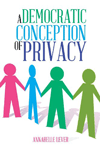NEW BOOK

A DEMOCRATIC CONCEPTION OF PRIVACY
Annabelle Lever
Published by AuthorHouse
September 23, 2013
Is privacy a threat to sexual equality, social solidarity and democratic government? Is privacy valuable only if we live in tyrannical regimes, or have shameful secrets to hide? The answer to these questions, this book maintains, is 'NO', because there are many forms of privacy that are essential to democratic government, and to the types of freedom, equality, solidarity and individuality that distinguish democratic from undemocratic societies. With chapters on privacy v. equality, the value of privacy, the right to privacy and on privacy, equality and abortion, this book provides an introduction to philosophical debates on privacy, and offers a distinctive way to think about them.
From the Introduction:
"Carol Pateman has said that the public/private distinction is what feminism is all about. I tend to be sceptical about categorical pronouncements of this sort, but this book is a work of feminist political philosophy and the public/private distinction is what it is all about. It is motivated by the belief that we lack a philosophical conception of privacy suitable for a democracy; that feminism has exposed this lack; and that by combining feminist analysis with recent developments in political philosophy, we can meet the philosophical and political need for a distinctively democratic conception of privacy.
This book then, is an effort to sketch and defend such a conception of privacy. It aims to show that while some conceptions of privacy are inconsistent with democracy, others are not. Indeed, the book asserts, the belief that privacy can be valuable and that it can justify basic legal rights, is implicit in a democratic conception of persons as free and equal beings, and a democratic conception of politics as the self-governing, or regulating, activity of such individuals. Just as we can and should reject undemocratic conceptions of the suffrage in favour of democratic ones, so the book maintains, we can and must reject undemocratic conceptions of privacy in favour of ones that reflect the moral equality of men and women, and a commitment to democratic forms of government.
Democracy is often described as government by and for the people. On such a view, democracy is a political regime which can be contrasted with monarchies or aristocracies on the one hand, or with theocracies and despotisms on the other. By contrast with the former, it is a form of government that views individuals as citizens and as equal members of the agency which authorizes the use of political power. By contrast with the latter, it is a form of government whose purposes and aims are established by the common interests of individuals, conceived as free and equal citizens.
It is my contention that there is a plausible and attractive conception of privacy implicit in this view of democracy. Hence, I show that individuals have fundamental interests in privacy because privacy enables them to participate in politics freely and as the equal of others and, beyond that, to lead lives that they can each affirm to be reasonable, valuable and right. As I think that the ideal of democratic government is properly associated with this latter and broader goal, as well as with the former one, I call my account of privacy a democratic conception of privacy to signal its connection to a particular ideal of politics, and to the conception of persons that makes this ideal a convincing and inspiring one."
